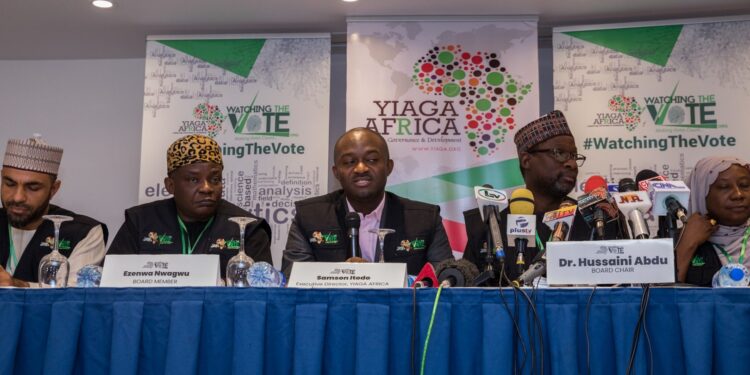Yiaga Africa, one of Africa’s non-profit organizations has recently noted a growing movement advocating for the abolition of State Independent Electoral Commissions (SIECs) and the allocation of the responsibility of conducting local government elections to the Independent National Electoral Commission (INEC).
YIAGA Africa, in a recent press release, emphasized that this policy proposal is fundamentally flawed and could have significant implications for Nigeria’s 25-year-old democracy if put into practice. One major concern is that it may overwhelm an already overburdened INEC, potentially resulting in poorly conducted local elections.
Additionally, the organization pointed out that this policy proposal undermines the autonomy of states as guaranteed in the Constitution, possibly leading to an excessive centralization of power in the Federal government. It was also highlighted that this move could weaken local democracy and citizen participation, as local communities would be deprived of the chance to be involved in decision-making processes.
Read full the Press Release Below
Introduction
Yiaga Africa has observed increasing calls for the abolition of State Independent Electoral Commissions (SIEC) and the transfer of the responsibility of conducting local government elections to the Independent National Electoral Commission (INEC). This policy proposal is fundamentally flawed and would have far-reaching implications for Nigeria’s 25-year democracy if implemented. First, it will overstretch an overburdened INEC leading to poorly conducted local elections. Second, it undermines the autonomy of states guaranteed in the Constitution, potentially leading to an over concentration of power in the Federal government. Thirdly, it weakens local democracy and citizens’ participation as local communities will be stripped of the opportunity to participate in decision-making.
In 2022, the National Assembly introduced a provision in the 2022 Electoral Act to regulate the procedure for LGA elections in a bid to salvage the integrity of local government elections. SIECs were compelled by the Act to conduct local elections in conformity with the procedures laid out in the 2022 Electoral Act. States have since been updating electoral laws to conform with the provisions of the 2022 Electoral Act.
Why SIECs should be retained
The abolition of SIECs contravenes the constitutional principle of state autonomy. The Constitution provides for a federal structure that ensures the devolution of powers to the states. By centralizing the conduct of local government elections under INEC, the proposal undermines this federal structure and erodes the autonomy of the states, leading to an unconstitutional overconcentration of power at the federal level.
Eliminating SIECs would weaken the state’s capacity for self-governance.
At a time, when the demand for local government autonomy enjoys national consensus, scrapping SIECs is a contradiction and it undermines the principles of federalism which hinge on the devolution of power. INEC’s current mandate is extensive and demands substantial resources and attention. The Commission is overburdened with numerous responsibilities such as conducting a significant number of elections in a general election year, including off-cycle governorship elections, bye-elections, and re-run elections. The commission is perpetually occupied throughout the electoral cycle with registration and regulation of political parties, voter registration, production of election materials and guidelines, and candidate nomination. Adding the responsibility of conducting local government elections would further strain the Commission, potentially leading to administrative inefficiencies and reduced effectiveness in managing electoral processes. This excessive burden would compromise the integrity of elections, contravening the fundamental right to free and fair elections as guaranteed by the Constitution.
Undoubtedly, SIECs have been underwhelming since the return to democracy in 1999 due to capture by state governors, weak or ineffective legal framework, underfunding and limited election administration capabilities. These factors have resulted in poorly conducted and flawed local council elections. Yiaga Africa’s position is that while the calls for abolishing SIECs are understandable, there’s no antidote to flawed LGA elections. The proposal fails to address the underlying causes of ‘electoral coronation’ masquerading as elections at the local level. Transferring the responsibilities of SIECs to INEC is akin to treating the symptoms rather than the root cause. In an electoral context defined by executive lawlessness, electoral impunity and ineffective accountability measures, abolishing SIECs would not fix the problem of bad elections at the LGA level or promote local government autonomy. Rather than scrap SIECs, the National Assembly and executive should consider implementing stricter sanctions or legislation that criminalize dissolution of local government councils including withholding federal allocation to states that fail to conduct Local Government elections or guarantee operational and financial independence of SIECs.
As a pathway to strengthening electoral democracy at the local government level, Yiaga Africa makes the following recommendations;
1. Amend the Constitution to explicitly safeguard the operational, administrative and financial independence of SIECs. Ensure that the power of the SIECs to make its own rules and regulate procedures should not be subject to the approval or control of governors, thereby protecting their autonomy
2. Address the ambiguity regarding the tenure of Local Government Chairmen and councillors through constitutional amendments to minimize arbitrary dissolutions of local governments by Governors supported by state legislatures. Establish clear timelines for making appointments into SIECs.
3. Introduce additional mechanisms for equitable devolution of power to state and local government, including laws that empower local governments with greater administrative and fiscal autonomy.
4. It is imperative for state assemblies to enact a robust legal framework for SIEC activities, including guidelines for conducting elections, dispute resolution procedures, and penalties for electoral misconduct. State electoral laws must be harmonized with the provisions of the 2022 Electoral Act to ensure uniformity and legal coherence.
5. SIECs should invest in capacity development to improve the quality of election administration at the state level. This includes training for electoral officers, acquisition of modern electoral technologies, and improvement of administrative processes.
6. Political parties, civil society organizations and media organizations should take immediate measures to conduct extensive voter education and civic engagement initiatives at the local level to encourage citizen participation in local government elections.
Conclusion
Abolishing SIECs is not a solution to flawed local government elections. Instead, addressing the underlying issues and strengthening SIECs through legal and institutional reforms will enhance local democracy and preserve the integrity of LGA elections.
Signed.
Samson Itodo
Executive Director
7th June 2024
















